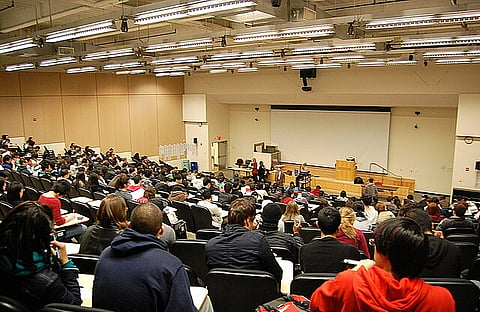
- Home
- NewsGram USA
- India
- न्यूजग्राम
- World
- Politics
- Entertainment
- Culture
- Lifestyle
- Economy
- Sports
- Sp. Coverage
- Misc.
- NewsGram Exclusive
- Jobs / Internships

In a bid to make their voices heard by decision-makers around the world, more than 700,000 children and adolescents between the ages of 10 and 24 participated in the project that coincides with this year’s observance of International Youth Day.
The Partnership for Maternal, Newborn and Child Health, or PMNCH, is a global alliance for the health and well-being of women, children and adolescents, hosted by the World Health Organization. In an effort to work toward improvements, PMNCH shared the preliminary findings of the largest survey into what young people want for their well-being.
The project aims to collect the voices of at least 1 million young people by October, when PMNCH will convene a global forum for adolescents at which the results of this mammoth undertaking will be unveiled.
“To date, there has not been enough knowledge, there has not been enough accountability and evidence around adolescent well-being,” said Helga Fogstad, PMNCH executive director. “This is our effort, together with this 1 million young people, intended to rectify.”
Young people were asked to express their views on a multitude of issues, including climate change, good health, optimum nutrition, connectedness, positive values, contributions to society, safety and a supportive environment.
“Adolescents and young people are responding to a fragile world of high living costs, pandemic disruptions, climate crises” and the rising complexities of the world “in which they live,” said David Imbago, a board member of PMNCH.
“Young people in low- and middle-income countries have been among the most affected of our increasingly fragile world, and there is no way to deny that,” he said. “For example, there are still consequences from the pandemic to school education, household food insecurity and income scarcity.”
UNICEF reports that more than 616 million students remain affected by full or partial school closures during the COVID-19 pandemic. In low- and middle-income countries, it says, school closures “have left up to 70% of 10-year-olds unable to read or understand a simple text.”
More than two-thirds of respondents, 68.8%, are from the Africa region, followed by the Southeast Asia region at 27.5%, and a small minority from Latin America. Most respondents come from India. Uganda is the second-largest contributing country, followed by Indonesia and Zambia.
The survey uses digital technology and face-to-face outreach through teams of trained youth mobilizers.
“I was excited to be a part of this campaign that was asking what we young people want for our well-being and try to be heard by policymakers and government and taking action on them,” said Deep Shikha, a young mobilizer from India.
Shikha said she and her mobilizing team gathered information from chatbots online, visited schools and colleges, and interviewed people in local communities.
“We discussed with young people about what they want, what challenges they face and what they felt was ignored by officers and policymakers,” she said.
Shikha said most of the young people wanted the opportunity to get a higher education but were frustrated by a lack of resources like an essay writing service available at hand. She said girls were discouraged from getting an education.
“Their parents do not want to send their child to another city for their higher education because they are concerned about their safety,” she said. “And, of course, there are girls who do not get an education because of lack of financial support.”
The survey indicated that addressing the concerns of adolescent girls worldwide was more challenging than addressing adolescent boys’ concerns about health, education, safety, security and well-being.
Looking for healthcare or medical internship or volunteer opportunities in the health care sector?- Search at MedBound List: https://www.medbound.com/public-internship
“It is not a matter of perception,” board member Imbago said. “It is reality.”
PMNCH expects the upcoming Global Forum for Adolescents to energize the 1.8 Billion Young People for Change campaign. The campaign was launched last year to help young people reach their full potential by influencing governments to change current policies and investments that fail to meet their needs.
“The voices of young people and adolescents need to be amplified, and the governments’ budgets and plans need to be more explicit about what young people want,” said Fogstad, the PMNCH executive director.
“This is a population and a generation that has not got enough attention because the evidence was missing,” she said, adding that the evidence produced by the survey results puts an end to that argument.
She said the movement of young people has been converted into a global movement “where young people are now increasingly taking the lead. And that is how it should be.” (VOA/NJ)
